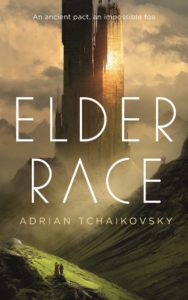I think Doug liked this one a lot more than I did.
 Lynesse Fourth Daughter is a princess who still believes in the old chivalric tales of courage and oaths. When the lands adjoining her mother’s Lanessite Empire are overrun by what the refugees refer to as demons, she chafes at the prevailing wisdom that the refugees are exaggerating and that Lanessite should adopt a wait and see attitude to the threat, while reluctantly allowing refugees shelter on their borders. With the assistance of Esha Free Mark, a woman from an amphibious strain of humanity which counts itself mostly free of Lanessite rule, Lynesse takes it upon herself to invoke the ancient oaths and wake the last of the Elder Race, the sorcerer Nyrgoth Elder. She believes that the demons are an existential threat to humanity, and that the sorcerer is their only hope.
Lynesse Fourth Daughter is a princess who still believes in the old chivalric tales of courage and oaths. When the lands adjoining her mother’s Lanessite Empire are overrun by what the refugees refer to as demons, she chafes at the prevailing wisdom that the refugees are exaggerating and that Lanessite should adopt a wait and see attitude to the threat, while reluctantly allowing refugees shelter on their borders. With the assistance of Esha Free Mark, a woman from an amphibious strain of humanity which counts itself mostly free of Lanessite rule, Lynesse takes it upon herself to invoke the ancient oaths and wake the last of the Elder Race, the sorcerer Nyrgoth Elder. She believes that the demons are an existential threat to humanity, and that the sorcerer is their only hope.
Nyr Illim Tevitch is an anthropologist who freely admits that he probably isn’t as good at his job as he should be. Sent with a team to observe this offshoot civilization that grew out of Earth’s once-active interstellar colonization program, he was the one who volunteered to stay behind when the rest went home to investigate what seemed to be an ongoing breakdown in communications between them and headquarters. The others never came back, and the breakdown seemed irreparable. Still, he has his satellite and his technology, allowing him to go into deep hibernation beneath active phases of observation, in hopes of one day being called back, too. Oh, tho one time he did actively involve himself in assisting Astresse Regent against an usurper who had found a way to reawaken old-Earth technology, telling himself it was better that he use his tech to disrupt the adoption of same by unskilled hands (tho he knows that that reasoning was really an excuse to spend time with the lovely queen.)
Generations have passed since, and legends of his time with Astresse have now brought Lynesse to his doorstep. Hijinks ensue as he tries to explain that he’s not a magician but a scientist: alas that her language conflates the two. Regardless, he agrees to help her and Esha, even as he fights his own crippling depression at being the last of his kind.
That latter was, I felt, the most compelling part of the narrative, as a deeply unhappy Nyr tries to cope with his loneliness and anxiety with the help of emotion-regulating technology. When he finally relinquishes one hope for another, he at last finds a path toward happiness and personal, if not professional, fulfillment: a sentiment I can definitely root for. The ways in which language and story evolve were also interesting, but I felt that the whole “any sufficiently advanced technology is indistinguishable from magic” subplot was rather tired, or at least added nothing new to the canon. I love science fantasy so was rather surprised at how underwhelmed I was with its treatment here: people with perhaps a shallower acquaintance with genre, or at least a different acquaintance, may be more impressed.
It doesn’t help that that demon isn’t actually given a scientific explanation. It’s a vaguely techno-Lovecraftian creation: frightening, but handled in a hand-wavy manner that feels at odds with the rest of the book’s “there’s a reasonable explanation for everything” tenor. I think that if the demon had been better handled, I wouldn’t have felt so impatient with everything else, tho in fairness I was already halfway checked out after reading the dedication to Gene Wolfe, whom I loathe. Ah, well, four more novellas in the Hugo category to read: surely one of them will feel worthy of the title this year.
Elder Race by Adrian Tchaikovsky was published November 16 2021 by Tordotcom and is available from all good booksellers, including
